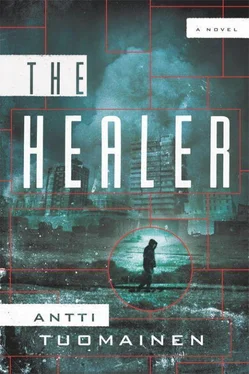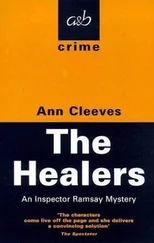He turned around slowly and pointed at the menu on the wall in a pose that gave me a good look at his arm.
“It starts with a K. Then an A. Then H and V, and one little I. That spells KAHVI. And that number after it tells you how much it costs.”
I dug a coin out of my pocket and tossed it on the counter. He didn’t put it in the cash register, but instead dropped it into the glass mug next to it. Then he started taking bottles out of the cardboard box. After a while he noticed me watching him. He straightened up and turned toward me.
“Don’t tell me,” he said. “You forgot to ask for milk.”
The air conditioner hummed. I didn’t say anything.
“Sugar?”
He sighed and put his hands on his hips.
“So you’re just a mad starer, are you?” he said. “OK. Drink your coffee and get outta here.”
“I’m not a mad starer. But I’d be happy to drink my coffee and get out of here if you’ll tell me where I can find the bartender who was working here last night. Big guy with a ponytail. Is he working today?”
He took his hands off his hips and folded his arms across his chest, screwed up his lips, and looked at me like I was cluttering up his decor.
“I think you better finish your coffee—”
“And get outta here. I understand. Is he coming in to work today? Or do you have the guy’s phone number?”
“What do you want with his phone number?”
I looked at him for a moment.
“I thought I might call him,” I offered.
“Why?”
“Why do people usually call each other? Maybe I’m a friend of his who lost his number.”
“You don’t look like a friend of his.”
I looked at him again.
“What do you think a friend looks like?” I asked. “Do his friends look different than friends usually do? How can you tell if somebody’s a friend of his?”
His eyebrows and cheekbones seemed to be squeezing his eyes right out of his head now.
“What kinda clown are you?”
“I’m not a clown.”
“You are a clown ’cause I said you’re a clown.”
I took a breath. My body ached with exhaustion and frustration. I realized that there was no point in bantering with him—it would only make my task harder if I got into an argument—but I couldn’t stop myself.
“That’s not how it works,” I said. “Things aren’t what you say they are just because you say it. Some small children believe that, but you’re an adult—or you look like one, anyway.”
“Are you trying to fuck with me?”
“No, I’m just looking for the bartender that was here yesterday, the guy with the ponytail.”
He took a couple of steps toward me, leaving just the half-meter-wide glass-covered counter between us. I glanced to my left, toward the barroom. The music apparently blotted out our little exchange because the eyes of the clientele stayed glued to their telephones, the tabletops, and the empty air.
“Get lost,” he said.
“Or else what?” I asked, suddenly completely tired of the conversation and every other difficulty I was encountering. “What’s the guy’s name?”
“Go fuck yourself.”
“OK. And where does this Go Fuck Yourself live?”
“Up your ass.”
“You must’ve skipped biology. Along with all your other classes, I’ll bet. What classes did you go to?”
“The classes on how to cut morons like you to pieces.”
“Oh, do they still teach that? I was under the impression that they’d practically discontinued that kind of instruction. It’s good to hear that children are still being properly educated.”
He leaned over the counter and raised his hand. A retractable baton clicked out to its full length. I backed away. Thrown out of the same bar for the second time in twenty-four hours, I backed up all the way to the door and stopped.
“Tell him hello from me,” I said.
He came around the bar after me. I was already in the street and walked quickly toward the center of town, satisfied with my visit. It was a sure thing that word would get around and eventually reach the right ears. If I couldn’t find Tarkiainen, I’d let him find me.
The mouse-gray, drizzly day was half over when I stepped off a tram full of damp clothes, violent coughs, and worried looks at the stop in front of Stockmann department store. Downtown Helsinki was doing its best to remind us that tomorrow was Christmas Eve. Here and there a lone string of Christmas lights twinkled desperately, looking in their feeble glimmer like they missed not just their finer days but also their lost comrades.
A few drops of rain fell on my face, all the colder for their paucity. I wiped them away, slipped into the flow of people, and didn’t notice until I was halfway across the street that I was walking into the middle of traffic. I heard a choir singing “Silent Night” from somewhere up ahead.
There was a large decorated spruce tree at Three Smiths Square. Its red and yellow lights glowed in the drizzle like thousands of little traffic signals escaped from their poles. Next to the tree an armored police car was parked. There were a lot of police on foot, too, as well as private security guards. The security guards walked in pairs wearing black or gray coveralls, a few of them crossing in front of traffic, and as many on the sidewalks as there were Christmas shoppers. I counted six security guards under the clock in front of the entrance to Stockmann. And there were more inside the store, of course, in plain clothes.
Charities collecting donations lined the square. Everybody could use some cash. The recipients were mostly people in Finland and nearby countries: schools, hospitals, children’s services. The Salvation Army’s traditional kettle stood in the middle of the square. A Salvation Army choir stood around it—four women and three men singing “Silent Night.”
I dug a bill out of my pocket and dropped it in the kettle. I thought about how I was eating up our savings—the money I’d spent over the past day and a half was more than I’d spent in the previous six months put together. The savings were supposed to be for emergencies. If Johanna’s disappearance wasn’t an emergency, then what would be? I dropped another few coins into the pot and continued east on Aleksanterinkatu.
I passed windows that promised discounts of up to 95 percent. The jewelry stores were advertising brand-name watches at prices that would have caused a stampede a year earlier, but now the gold and platinum timepieces sat in their glass cases measuring a time that no longer existed.
The fast food places had all closed. The shoe stores and clothing stores were toughing it out with the help of Christmas shoppers. The tavern on the corner of Mikonkatu and Aleksanterinkatu had a sign advertising cheap beer and lunch, with lunch crossed out.
I turned left on Mikonkatu, continued right on Yliopistonkatu, and found myself in the middle of a fight.
The large, broad-shouldered, bald man who looked like a native Finn was wearing a short leather jacket. He seemed an overwhelming opponent for the other man, a slim young Asian in a hooded sweatshirt who was little more than a boy. The bald man was trying to get the younger one in front of his hefty fists, and the young one was dodging them nimbly. After evading a few right jabs, he let his left foot do the talking.
The kick surprised everyone, but especially the bald fellow. The thump and the crunch of the bone in his nose could be heard from meters away. He staggered and tried one last punch, throwing all his weight behind it. The young man dodged him again and answered with a high, quick right-legged kick that struck the bald one somewhere in the vicinity of his ear and looked and sounded like it hurt.
The older man’s arms dropped to his sides, and the young man moved in front of him. He busted the older man’s lip with two swift smacks, like opening a packet of ketchup, and ended with three blows to his chin, which seemed to give way under the lightning-quick punches.
Читать дальше












